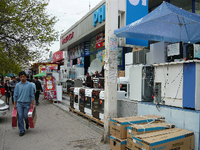Clare Nuttall in Almaty -
On one of Uzbekistan's busiest boulevards, televisions, DVD players, freezers and other home electronics and white goods - almost all South Korean brands - spill out from the row of shops onto the pavement, creating a bazaar-like buzz in downtown Tashkent.
But the small shops on Navoi Street, most of them little more than market stalls, hide a much bigger and less successful South Korean business venture: a football-pitch-sized empty lot that had been designated as the location for the Navoi Centre, a $500m mixed-use development backed by a consortium of South Korean investors. The consortium is understood to have sunk as much as $80m into the site, mainly in buying out the owners of the existing buildings before razing them to the ground. But when credit dried up, they were forced to stop work on the project.
The failure of the Navoi Centre development is an unusual story in Tashkent. With the exception of the high-rise hotels and business centres that mushroomed before the 2003 summit of the European Bank of Reconstruction and Development, most developments have been on a relatively modest scale. Unlike in nearby Almaty, almost all - with the exception of those launched by Russian, Kazakh or South Korean developers - have been pre-funded and little credit has been used. "Companies who have started construction in Uzbekistan have already financed and probably pre-sold the full development. They don't use big loans here," says Rano Kholmuradova, CEO and head of the real estate department at Avesta Investment Group.
However, she doesn't expect new projects to be launched at the same pace as before under current conditions. "Developers have enough money to finish ongoing projects, but we don't expect they will want to start new ones at present. Most of the projects going to be finished now are those which were started in previous years," she says. "We think the situation in Tashkent is the same as in many other CIS countries, and we think that developers will wait for further understanding of the situation on the market in terms of price behaviour and real demand for their future apartments."
Buy to live
The impact of the international economic crisis on Uzbekistan has been relatively small. Its effects started to be felt late in 2008, and the picture already seems to be improving. In January, the International Monetary Fund (IMF) forecast GDP growth of 7% this year. However, real estate is one of the sectors taking a hit due to the faltering economies of Uzbekistan's main trading partners. "The real estate market is still interesting, but without money coming in from Kazakhstan, Russia and Korea, there has been a fall in demand. Back in 2008, about 70% of new apartment blocks were being bought for an investment; now people only buy a new apartment if they want to live in it," explains Kholmuradova.
The investment purchases that fuelled Tashkent's modest property boom have largely stopped as prices started to drop in 2008. According to Kholmuradova, by April property prices were 25-30% lower than at their peak in August 2008. Research from local property consultancy Lebed Kapital Invest finds that the largest decline - between 15% and 30% - is in the secondary residential market; few discounts have been made on newly built apartments. The report says a further decline is probable, though forecasts a resumption of growth by the end of this year. In the current volatile period, it considers that cheap properties and unique high-end properties are most likely to retain their value.
With investment purchases almost completely frozen and few new projects expected to start in the near future, what does this mean for Uzbekistan's construction materials sector?
This sector had been the destination of numerous investments in recent years, from new cement plants to small-scale shops. Now there are fewer building projects and the slowdown in remittances from expatriate workers has forced homeowners reluctantly to cut back on their home improvements and DIY.
In 2008, the Uzbek government announced plans to build more than 9.5m tonnes of additional cement production capacity by 2013 to supply both the local market and Uzbekistan's neighbours. However, slowing demand has led to an expected spare capacity of 2m tonnes this year if the construction markets in Russia and Kazakhstan do not pick up. However, it appears the government is stepping in to make up the shortfall in private sector demand. "Real estate is not a good theme for investors at present, but it's a good time for construction companies because the government is trying to support the construction sector with state orders," says Komil Ruzaev, director of Essential Investments. "There are also many large projects planned by international companies, such as Lukoil, Gazprom, CNPC and Petronas."
As for the excess export capacity, Tashkent is keen to start exporting some of this to Afghanistan. Becoming a supplier for that country's massive post-war reconstruction effort will mean Uzbekistan is no longer dependent on the growth of the Kazakh and Russian property markets.
Send comments to The Editor

Related Articles
VimpelCom makes $1bn loss as Uzbek corruption case escalates
Jacopo Dettoni in Almaty - Russian telecom VimpelCom reported a $1bn net loss in the third quarter of 2015 after it made a $900mn provision for alleged wrongdoings in Uzbekistan, the company ... more
Uzbekistan to cut car output amid falling exports, remittances
Olim Abdullayev in Tashkent - Collapsing car sales in major export markets have, to the delight of many Uzbeks, meant a flood of cars unsold abroad coming on to the local market. To prop up car ... more
COMMMENT: Great challenges for Eurasia call for decisive solutions
Juha Kähkönen of the IMF - The Caucasus and Central Asia (CCA) region continues to navigate a wave of external shocks – the slump in global prices of oil and other key commodities, the slowdown ... more